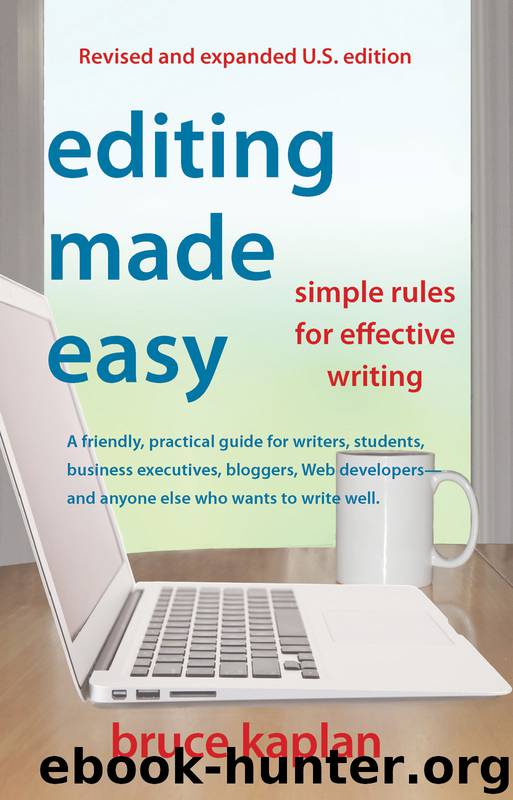Editing Made Easy by Bruce Kaplan

Author:Bruce Kaplan
Language: eng
Format: epub
Publisher: Upper Access, Inc.
Published: 2012-07-28T16:00:00+00:00
collective nouns
which verb form do I use?
A collective noun is a singular word for a group of people, animals or objects. For example:
a class of students
a flock of birds
a herd of cows
Because collective nouns are singular, they take a singular verb. Thus we have:
the audience is
the class is
the club is
the committee is
the crew is
the family is
the fire brigade is
the flock is
the group is
the herd is
the police force is
the team is
Green Bay (football team) is
However, when writing about individuals who make up a group, or when the name of a team, group or club ends with an s, we use the plural verb are:
audience members are
the students are
club members are
committee members are
crew members are
family members are
fire brigade officers are
the birds are
group members are
the cows are
the police officers are
team members are
Baltimore players are
Green Bay players are
the Baltimore Orioles are
the Green Bay Packers are
Collective nouns offer plenty of room for debate and variation.
For example, the word couple (as in man and wife). Couple certainly is a collective noun. Therefore we technically should write:
The couple is going to different classes.
A couple was rescued after its car went over a cliff.
But this can sound awkward and sometimes plain silly (is, was, its). The secret is to regard a couple as two entities—and use a regular plural:
The couple are going to different classes.
A couple were rescued after their car went over a cliff.
The same situation applies to the word family. We can regard a family as one unit (collective noun) or as a number of people (plural).
Download
This site does not store any files on its server. We only index and link to content provided by other sites. Please contact the content providers to delete copyright contents if any and email us, we'll remove relevant links or contents immediately.
Asking the Right Questions: A Guide to Critical Thinking by M. Neil Browne & Stuart M. Keeley(5775)
Autoboyography by Christina Lauren(5235)
Eat That Frog! by Brian Tracy(4540)
Dialogue by Robert McKee(4403)
Sticky Fingers by Joe Hagan(4198)
Journeys Out of the Body by Robert Monroe(3624)
Annapurna by Maurice Herzog(3467)
Full Circle by Michael Palin(3449)
Schaum's Quick Guide to Writing Great Short Stories by Margaret Lucke(3381)
Elements of Style 2017 by Richard De A'Morelli(3349)
The Art of Dramatic Writing: Its Basis in the Creative Interpretation of Human Motives by Egri Lajos(3067)
Atlas Obscura by Joshua Foer(2962)
Why I Write by George Orwell(2953)
The Fight by Norman Mailer(2940)
The Diviners by Libba Bray(2937)
In Patagonia by Bruce Chatwin(2930)
The Mental Game of Writing: How to Overcome Obstacles, Stay Creative and Productive, and Free Your Mind for Success by James Scott Bell(2908)
Venice by Jan Morris(2573)
The Elements of Style by William Strunk and E. B. White(2473)
